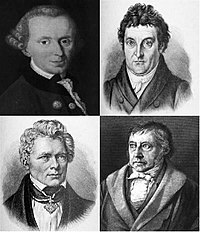
Back Duitse idealisme Afrikaans مثالية ألمانية Arabic Almaniya klassik fəlsəfəsi Azerbaijani آلمان ایدئالیزمی AZB Idealisme alemany Catalan Německý idealismus Czech Tysk idealisme Danish Deutscher Idealismus German Γερμανικός ιδεαλισμός Greek Idealismo alemán Spanish

German idealism is a philosophical movement that emerged in Germany in the late 18th and early 19th centuries. It developed out of the work of Immanuel Kant in the 1780s and 1790s,[1] and was closely linked both with Romanticism and the revolutionary politics of the Enlightenment. The period of German idealism after Kant is also known as post-Kantian idealism or simply post-Kantianism.[2] One scheme divides German idealists into transcendental idealists, associated with Kant and Fichte, and absolute idealists, associated with Schelling and Hegel.[3]
- ^ Beiser, Frederick C. (2002). German Idealism: The Struggle Against Subjectivism, 1781–1801. Vol. Part I. Harvard University Press.
- ^ Pinkard, Terry (2002). German Philosophy 1760–1860: The Legacy of Idealism. Cambridge University Press. p. 217.
- ^ Dunham, Jeremy; Grant, Iain Hamilton; Watson, Sean (2011). Idealism: A History of a Philosophy. Durham: McGill-Queen's University Press. p. 303 n. 4.
© MMXXIII Rich X Search. We shall prevail. All rights reserved. Rich X Search